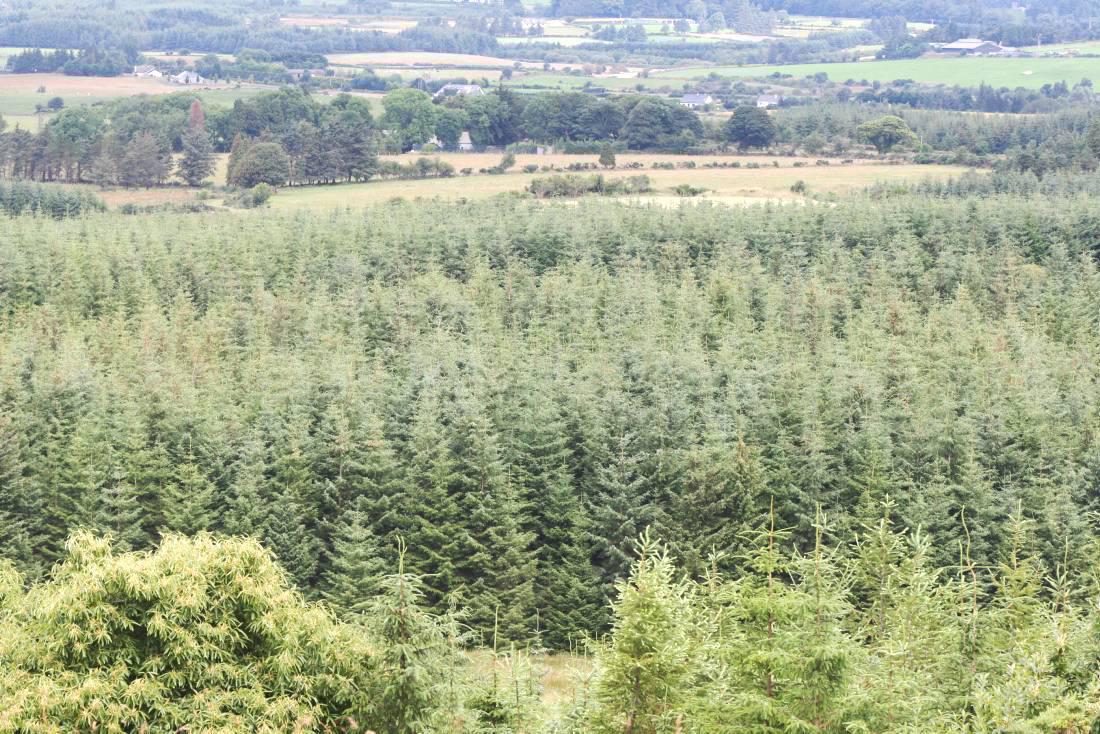The impact of climate change on Irish forestry and the mitigating role Ireland’s forests may have against climate change were examined at the Coillte Climate Change and Irish Forestry Conference held on Friday in Farmleigh House.
EU Commissioner for Agriculture Phil Hogan opened the conference, saying that while there was a pressing need for sustainable forestry strategies, it must occur in a manner that does not affect Ireland’s food production.
“There is a pressing need to ensure the long-term sustainable management and development of forests, balancing the economic, social and environmental benefits they deliver.
“It is critical that sustainable forestry strategies are developed hand-in-hand with sustainable food security solutions. This is as true for the rest of Europe as it is for Ireland,” Hogan told the audience.
The conference brought together national and international forestry and environmental experts and industry stakeholders to address the risks and opportunities that climate change presents to the Irish forestry sector.
Speaking to the Irish Farmers Journal, IFA environment chair Harold Kingston said that Hogan's statement on Ireland's food security in terms of climate change was "a vital one". He said that countries like Germany are now having to import more food as a result of an increase in forested land.
COP 21 agreement
Coillte CEO Fergal Leamy said the COP21 was an “ambitious agreement”, and that Irish forests now have a significant role to play in climate change.
“Key to the COP21 agreement from an Irish perspective is that the balancing of greenhouse gas emissions will occur in a manner that does not threaten Ireland’s food production, while article five of the agreement contains strong recognition of the role of forests in mitigating climate change.
“COP21 is an ambitious agreement that aims to limit the global temperature increase to well below 2°C above pre-industrial levels by the end of the century. It is our view at Coillte that we must be equally ambitious and that Irish forests have a significant role to play in climate change in four key ways; mitigating carbon emissions, providing wood as a sustainable and natural substitute for energy intensive materials, supplying biomass to decarbonise the Irish economy and providing the land to seamlessly integrate renewable energy sources such as wind and solar,” he said.
For Ireland to make significant progress on each of these four areas, Leamy says, we need to do more than simply set targets.
“We must understand the economic case for each and challenge how we currently think about driving a return for investment in these areas.
“While it is important that government policies continue to support these economic cases, it is also up to us as business managers to work with government to take a fresh look at how we make a return on these investments and Coillte is keen to play an active role in delivering solutions which are economically, socially and environmentally sustainable,” he said.
Read more
Full coverage: Climate Change
The impact of climate change on Irish forestry and the mitigating role Ireland’s forests may have against climate change were examined at the Coillte Climate Change and Irish Forestry Conference held on Friday in Farmleigh House.
EU Commissioner for Agriculture Phil Hogan opened the conference, saying that while there was a pressing need for sustainable forestry strategies, it must occur in a manner that does not affect Ireland’s food production.
“There is a pressing need to ensure the long-term sustainable management and development of forests, balancing the economic, social and environmental benefits they deliver.
“It is critical that sustainable forestry strategies are developed hand-in-hand with sustainable food security solutions. This is as true for the rest of Europe as it is for Ireland,” Hogan told the audience.
The conference brought together national and international forestry and environmental experts and industry stakeholders to address the risks and opportunities that climate change presents to the Irish forestry sector.
Speaking to the Irish Farmers Journal, IFA environment chair Harold Kingston said that Hogan's statement on Ireland's food security in terms of climate change was "a vital one". He said that countries like Germany are now having to import more food as a result of an increase in forested land.
COP 21 agreement
Coillte CEO Fergal Leamy said the COP21 was an “ambitious agreement”, and that Irish forests now have a significant role to play in climate change.
“Key to the COP21 agreement from an Irish perspective is that the balancing of greenhouse gas emissions will occur in a manner that does not threaten Ireland’s food production, while article five of the agreement contains strong recognition of the role of forests in mitigating climate change.
“COP21 is an ambitious agreement that aims to limit the global temperature increase to well below 2°C above pre-industrial levels by the end of the century. It is our view at Coillte that we must be equally ambitious and that Irish forests have a significant role to play in climate change in four key ways; mitigating carbon emissions, providing wood as a sustainable and natural substitute for energy intensive materials, supplying biomass to decarbonise the Irish economy and providing the land to seamlessly integrate renewable energy sources such as wind and solar,” he said.
For Ireland to make significant progress on each of these four areas, Leamy says, we need to do more than simply set targets.
“We must understand the economic case for each and challenge how we currently think about driving a return for investment in these areas.
“While it is important that government policies continue to support these economic cases, it is also up to us as business managers to work with government to take a fresh look at how we make a return on these investments and Coillte is keen to play an active role in delivering solutions which are economically, socially and environmentally sustainable,” he said.
Read more
Full coverage: Climate Change






 This is a subscriber-only article
This is a subscriber-only article











SHARING OPTIONS: